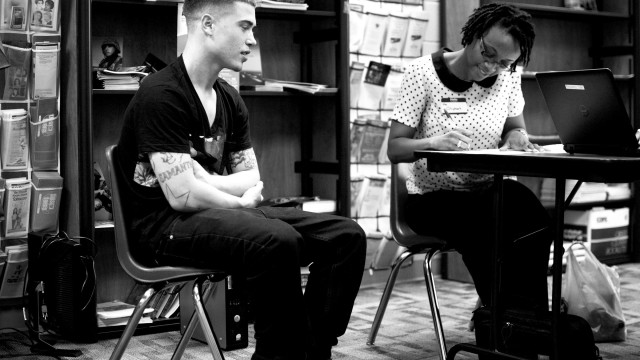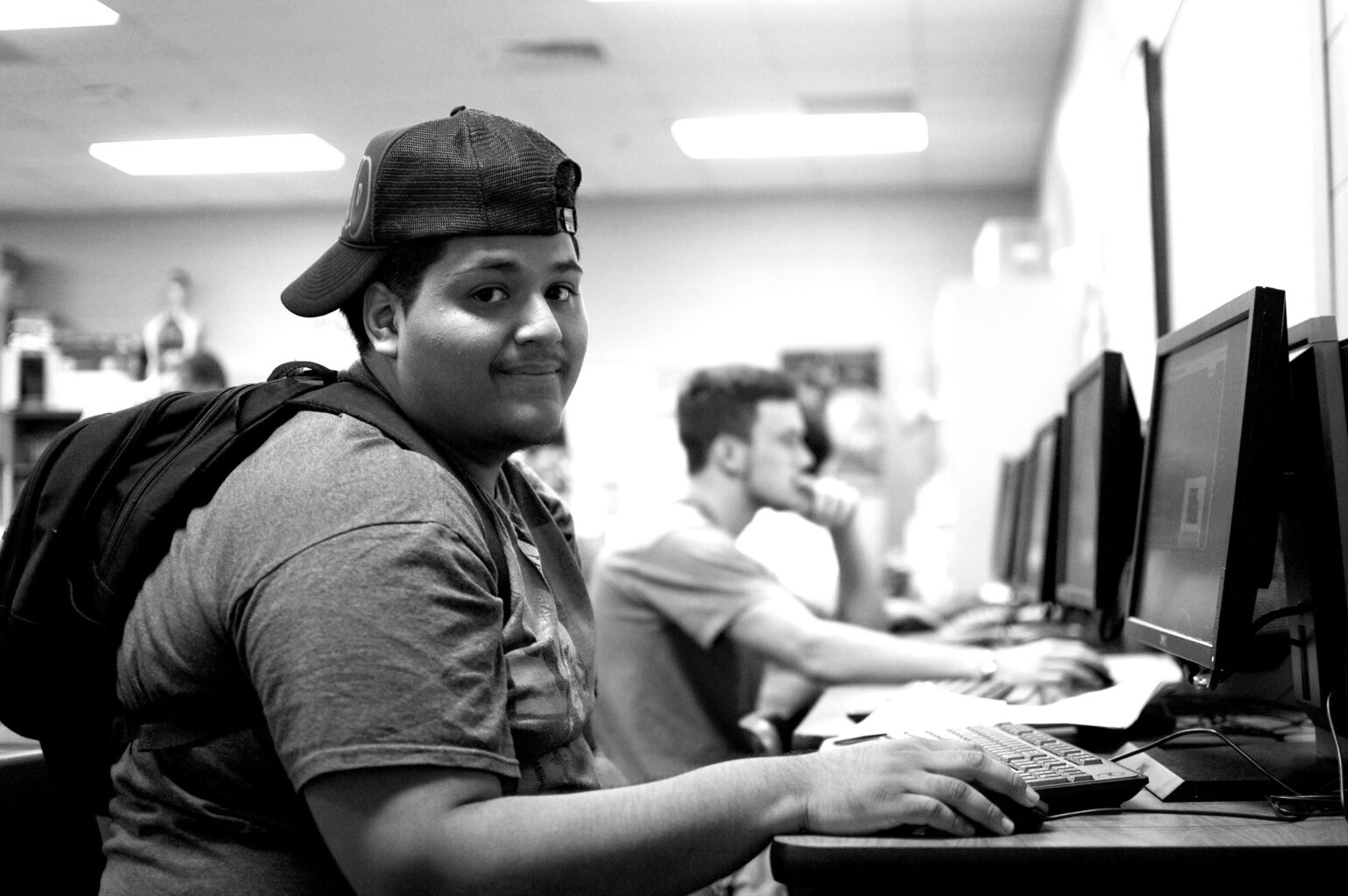Foothills Education Charter High School student Jesus Rangel completes his work on the computer during a Foothills class on Tues., Aug. 18. Rangel is one of many former Clarke Central High School students to now attend Foothills. “I’ve seen a lot of (former students) walk through the door and it’s been nice to see familiar faces,” Foothills on-site coordinator and former CCHS physical education department chair Dinah Posey said.
By VIOLET MERRITT – Staff Writer
Clarke County School District now have an alternative route to their high school diploma: Foothills Education Charter High School.
As she was nearing the end of her 22nd year at Clarke Central High School, Dinah Posey was about as settled in as a teacher could be.
She was the physical education department chair, the varsity golf coach and a well-respected teacher throughout the entire school.
But something called Posey to give it all up and chase something completely new.
That something: Foothills Education Charter High School.
“It’s probably one of the most rewarding jobs I’ve ever had.”
–Dinah Posey,
On-Site Coordinator
“(CCHS) is where I have been for so long,” Posey said. “But, I’m looking forward to starting a new chapter and challenge in my life.”
Posey was hired as one of the two on-site administrators for Foothills in anticipation of the school’s opening, and after a month of doing so, has found the alternative form of school to be satisfying.
“It’s probably one of the most rewarding jobs I’ve ever had because you see such immediate results and success from the students,” Posey said.
The premise
Foothills opened in August and has seven locations that include Athens-Clarke County, Baldwin County, Barrow County, Jackson County, Madison County and two correctional facilities: Burruss Correctional Training Center and Lee Arrendale State Prison.
“For those (students who can’t succeed in traditional high school,) we’re another option,” Foothills Executive Director Sherrie Gibney-Sherman said. “In some cases for some kids, a second chance. Because for whatever reason, and there’s no judgement, the regular high school didn’t work. The regular high school just can’t offer that, they can’t afford it, there’s not enough time and there aren’t enough resources, but we can.”
“Students enroll at Foothills for a variety of reasons,” according to Foothills’ website. Foothills can be a school for students who dropped out of high school, students who got behind in high school, students that have responsibilities during typical school hours like work or families of their own and students who “prefer the self-paced, mastery-based learning environment.”
“It’s different and it makes it easier too,” junior and current Foothills student Nikra Broabnax said. “I’m working at my own pace instead of rushing to get stuff done.”
Classic City
Foothills is not first form of alternative schooling in Athens. Classic City High School, where the Athens-Clarke County Foothills location is housed, also offers students an alternative path to graduation. However, according to Girtz and Gibney-Sherman, the two high schools are very different.
“(Foothills) offers a pretty strong program set of supports for students, that are a little bit different and more specific than Classic City’s supports,” Girtz said. “For example, every student has a designated mentor, that mentor is a paid staff person who checks in with that student for a couple hours every week and checks in with people in the student’s life even every month, whether that’s a mother, father, aunt, boyfriend or girlfriend or grandmother, neighbor–whoever the kind of significant people are.”
“What Foothills has to offer is radically different from what Clarke Central has to offer.”
–Sherrie Gibney-Sherman,
Executive Director
In the CCSD, Foothills is open Monday through Thursday from 4-9 p.m. According to Foothills Regional Director of Student Services Kelly Girtz, the 4-9 p.m. time slot is designed for students who are not able to fit their other responsibilities around a traditional school schedule.
“(Foothills is) self-paced. So, some of the students probably will have day jobs or will have children of their own, the kind of family circumstances that don’t allow them to be there everyday,” Girtz said.
Charter District
The Clarke County School District became a charter district in 2014, following the Georgia mandate that required all local school systems to operate either as an Investing in Educational Excellence School System (IE2), a Status Quo School System or a Charter System.
When CCSD was beginning to look into becoming a Charter System, there was opposition in the community to a Georgia referendum on the topic of Charter Systems, according to CCHS parent and former CCSD board member Allison Wright.
“The state was making an amendment to the constitution about having charter districts where it took money away from schools,” Wright said.
However, the Georgia amendment that was in the legislature at the time was different than the CCSD becoming a Charter System. Under the amendment, traditional schools would lose funding. However, now that the CCSD is a Charter System, Foothills will not take away funding from other public schools.
“It’s a very confusing topic so I think that’s where people were concerned,” Wright said. “We were trying to get people to not vote for that referendum because of its financial problems, and at the same time, talk about (becoming a Charter System).”
Now that CCSD is a Charter System and the district’s first charter school has been created, Gibney-Sherman has heard some questions and concerns. But she believes that these stem from a lack of understanding.
“(Foothills is) not in competition at all with the regular high schools, not one little bit. What Foothills has to offer is radically different from what Classic City has to offer,” Gibney-Sherman said. “As a matter of fact, we encourage kids to go to the regular high school. That should be their first stop.”
“If they don’t want to come to us, they don’t have to come. That’s huge what I just said. Because if you are forcing a kid to have to go to school, it doesn’t work.”
–Sherrie Gibney-Sherman,
Executive Director
Like Wright, Gibney-Sherman also believes that the title of “charter school” is responsible for some objections.
“In the state of Georgia, if you’re a charter school, you are a public school–that’s real important to know. There’s nobody coming in here and funding this, it’s funded by your tax dollars. And it’s a public school meaning any student can come to us, it’s statewide,” Gibney-Sherman said. “The word charter just means that we’re giving flexibility to the state laws that govern how schools have to operate and as a charter school we’re a state charter school, we have flexibility on how we serve students.”
Founding principals
Gibney-Sherman finds it important that people know that Foothills is replicating a charter school that has 11 locations across Northeast Georgia and has been in existence since 1993: Mountain Education Charter High School.
“We’re not just making up something. We are modeling our school, Foothills Education Charter High School, after Mountain Education Charter High Schools. And that school has been in existence for (23 years),” Gibney-Sherman said.
An area in which Foothills offers flexibility and models MECHS directly is their attendance policy.
“If students are having a bad day, that’s a good day to stay home. And what the staff at Mountain Ed. have expressed is that when someone comes in and they’re evidently having a bad evening, typically the comment from the faculty person to the student is ‘Listen, I can tell you’re having a bad night, just go home and come back tomorrow,’” Girtz said.
Gibney-Sherman also does not believe students will take advantage of the attendance policy because they are choosing to attend Foothills.
“No one has to come to us. And if they don’t want to come to us, they don’t have to come,” GIbney-Sherman said. “That’s huge what I just said. Because if you are forcing a kid to have to go to school, it doesn’t work.”
Unlike traditional high school, at Foothills, content is delivered to students through technology, not by a teacher addressing a class.
“In our rooms, the classes are small, there won’t be more than 15 students, there will always be a certified teacher in that content area. For instance in science, you might have a science teacher who’s teaching in the room, but you’ll have students who are in different classes,” Gibney-Sherman said. “They could be in environmental science, they could be in biology, you know just whatever they’re taking. That teacher has to tune into each one of those classes in there so it’s hard work. You have to be on your game and know your content and know it well. But it’s not about the teacher, it’s about the student.”

Foothills Education Charter High School and former Clarke Central High School student Dakota Bunton is pictured at Foothills on Tues., Aug. 18. “They come here to work and we treat them like adults because they got to choose where they want to go,” Posey said.
Looking ahead
Coordinating at each of the Foothills locations are two site directors. At the Clarke County site, one of them is former CCHS Physical Education Department Chair Dinah Posey, who is confident that students will be able to succeed at Foothills.
“We have so much support in place for all of the students, mentors, counselors, graduation coaches, social workers and good quality teachers as well,” Posey said. “I feel like we’re just going to surround (students) with so much support.”
Posey sees Foothills helping students who traditional high school did not work for.
(Some students have) stumbled along the way and this provides them with another chance and it puts a high school diploma in their hand and it lets them work at their own pace and they have more choices. It gives them responsibility,” Posey said.
With the 2015-16 school year beginning, Gibney-Sherman is optimistic for Foothill’s future.
“Our goal is for those kids to get a high school diploma and making sure that we’re reaching out and finding the other kids who need it as well and then making sure it’s a good positive experience for the students we serve because they’re going to be the ones to tell other kids to come,” Gibney-Sherman said.
